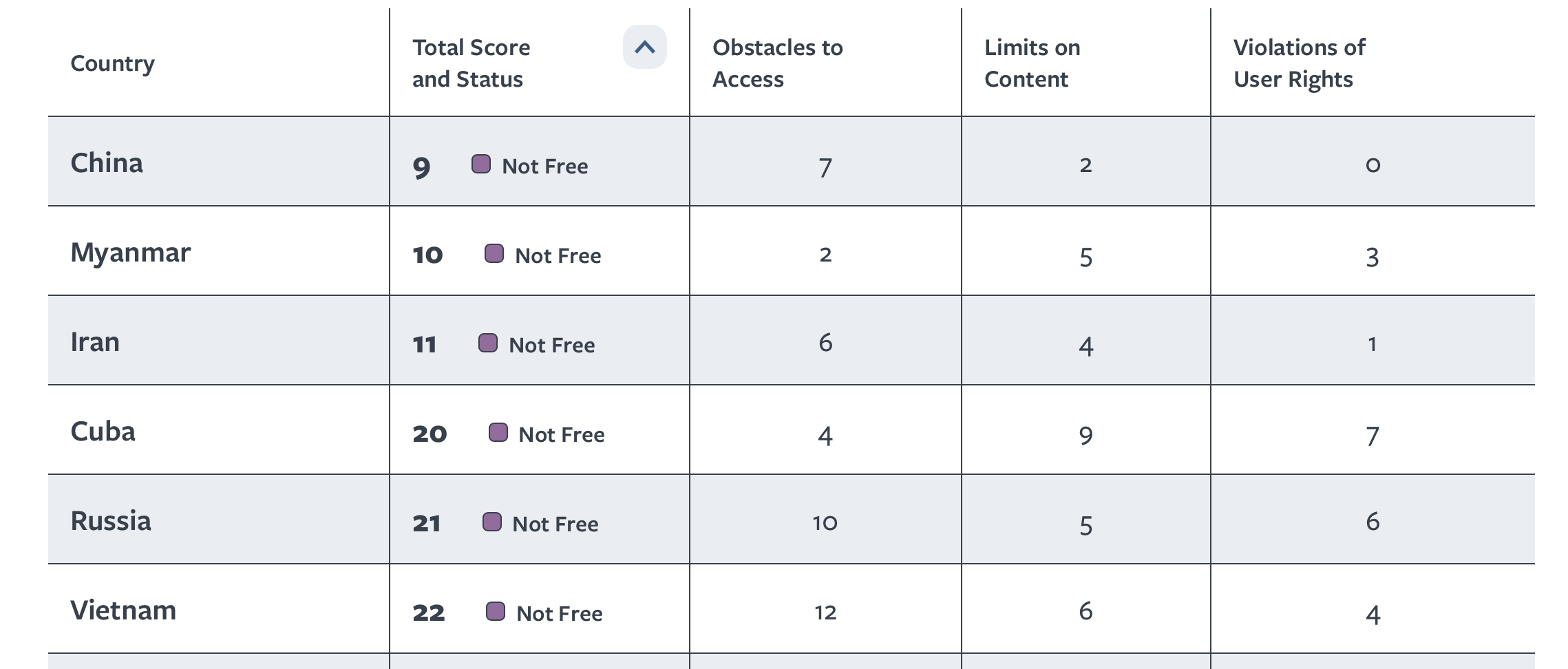Myanmar ranked as the world’s second most repressive environment for internet freedom in the world, according to an annual report released on Wednesday by Freedom House. Only China is worse and Iran is third on the list.
Since the coup in February 2021, the junta has consistently targeted online platforms and social media channels by imposing internet shutdowns, blocking access to social media platforms like Facebook, imposing restrictions on virtual private networks (VPNs) that can bypass internet censorship), and conducting online surveillance to control and monitor online activities.
Washington-based Freedom House said Myanmar’s military has tightened its harsh digital control over the country since the 2021 coup, and arrested people for simply expressing dissent online.
“Under military rule since a 2021 coup, the country’s internet users continued to express support for the democratic resistance movement or grief for the victims of the junta’s violence, all at great personal risk to themselves,” the report said.
Scores of internet users were imprisoned for their online activities during the coverage report’s coverage period: June 1, 2022 to May 31, 2023.

Military courts issued multiyear prison sentences and carried out executions in some cases, the report noted. “In the most egregious case from the coverage period, the military executed prominent activist Kyaw Min Yu, better known as Ko Jimmy, in July 2022, after arresting him for pro-democracy social media posts,” it said.
Ko Jimmy, a former National League for Democracy lawmaker, and two others were executed in July of last year for anti-regime activities. Ko Jimmy was accused of masterminding a campaign of guerrilla warfare against the regime in the country’s biggest city and threatening “public tranquility” with social media posts criticizing military rule. The regime also said Ko Jimmy was the leader of Operation Moonlight, which carried out hugely successful urban guerrilla attacks.
The army and its informants use Telegram groups to share information on dissidents, allowing the authorities to identify, detain and in some cases forcibly disappear them, it said.
Hip-hop artist Byuhar was among the most recent high-profile victims of the junta’s online crackdown. He was sentenced to 20 years in prison in August for posts on Facebook criticizing the junta’s handling of power outages.
Freedom House listed Myanmar as “not free” in its internet freedoms index, scoring only 10 on a 100-point scale. Last year, Myanmar scored 17 and in 2021, it scored 31. China scored nine points.
The junta frequently enforced short-term, localized internet shutdowns to prevent the opposition from organizing or sharing information about atrocities, effectively restricting internet access for millions of users, the report noted.
After the country’s last two foreign-owned telecommunications service providers, Telenor and Ooredoo, sold their Myanmar operations, all providers were left under either direct or indirect military control, enabling mass interception without safeguards, it said.
The report noted that most internet users remained confined to a list of about 1,500 military-approved websites and only those with circumvention tools were able to bypass extensive blocking and reach other internet resources.
The report also said that the military’s broad attempts to make the internet a hostile space—combined with a faltering economy and attacks on infrastructure—resulted in a globally rare decline in internet penetration.
Digital rights activists and advocacy groups have warned that the junta is attempting to build a surveillance state and urged the international community and technology companies to stand with the people of Myanmar and resist the coup—both physical and digital.

















